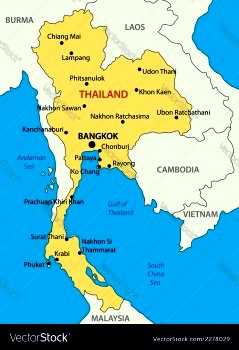“My legs are strong; my body is strong, a farmer’s body built for physical labor. The world has farmers, and I’m a good farmer. But right now I’m an elevator attendant even though such a job shouldn’t exist in this world. Is it so troublesome to lift your hand up and press a button that they have to pass this task off to someone else, someone who could do so many other things? If I had been born with one hand and an index finger this job would be suitable for me.” – from “The Attendant.
When I finished r eading Arid Dreams, the first collection of Thai author Duanwad Pimwana’s stories ever to be translated into English, I was so stunned that I had to wait a day before even beginning this review. To say it is a powerful and dramatic collection of thirteen short stories so understates the collection’s ability to affect the reader emotionally that it would be unfair to characterize it in such a limited fashion. Vibrant characters, intense interactions, and beautifully controlled themes feature in realistic stories about the daily lives of the hardworking poor and those who have dreams but little or no opportunity to act upon them. Cultural expectations play a big part in the conflicts and disasters which some of the characters face, and though these may be shocking to American readers, they are taken for granted by the characters themselves. As the reader becomes more and more deeply involved with these stories, which show people both as individuals and as members of a broader society, it is impossible not to care about them and how they live, doing what they must do to survive.
eading Arid Dreams, the first collection of Thai author Duanwad Pimwana’s stories ever to be translated into English, I was so stunned that I had to wait a day before even beginning this review. To say it is a powerful and dramatic collection of thirteen short stories so understates the collection’s ability to affect the reader emotionally that it would be unfair to characterize it in such a limited fashion. Vibrant characters, intense interactions, and beautifully controlled themes feature in realistic stories about the daily lives of the hardworking poor and those who have dreams but little or no opportunity to act upon them. Cultural expectations play a big part in the conflicts and disasters which some of the characters face, and though these may be shocking to American readers, they are taken for granted by the characters themselves. As the reader becomes more and more deeply involved with these stories, which show people both as individuals and as members of a broader society, it is impossible not to care about them and how they live, doing what they must do to survive.

Author Duanwad Pimwana’s earlier novel BRIGHT is the first novel by a Thai woman ever to be published in the US. (Citation from the Center for the Art of Translation)
The opening story, “Arid Dreams,” tells of a man who returns to a place that was his dream vacation spot when he was a student, now so overcrowded he must move to a village hotel away from the beach to find a room. While there, he becomes obsessed with a beautiful woman wearing an old-fashioned top and sarong whom he later discovers to be a masseuse. When he learns that she will spend the night with a guest at his hotel, he inquires about that, but though she will give him a massage, she will not spend the night. The reasons why make him see her in a completely different light. A similar change of opinion and attitudes also occurs in “Wood Children,” in which a woman desperate to have a child begins to carve images of children out of wood, becoming increasingly proficient. Worried about her growing obsession, her husband comes home one night with the young son of one of his construction workers, who will visit for the evening, and she is thrilled and happy as she bonds with the child. Convinced his wife no longer needs the wooden images she has been carving, her husband takes actions which have unexpected consequences. In “The Attendant,” quoted in the opening lines of this review, the main character nears the end of his shift as an elevator operator, a job in which he sits most of the day with only his hand and his head getting any real exercise. He is distressed that tomorrow he will again need to “have the strength to come back and sit still once again.” He bemoans his fate and the end of his dreams for the day.
These three stories – “Arid Dreams,” “Wood Children,” and “The Attendant” are all similar in that a main character is powerless to change circumstances in spite of his/her hopes, but they are very different in their effects on the reader. Whereas “Arid Dreams” is fairly light in subject, with a main character unable to procure the prostitute of his dreams, “The Attendant,” by contrast, has no way of controlling his dreams – and his memories of the past – because of his poverty and need for work. “Wood Children” is, by far, the most involving of these three, dealing as it does with the desperate dream of a woman for a child and the accidents of chance which determine her life and over which she has no control.
“Men’s Rights,” a title which says it all, is a powerful story of cultural differences, and when it appears at about the mid-point of the collection, the reader will already have recognized that in these stories women are constantly being required to act in ways established by the culture but contrary to what they would choose to do on their own. Here a husband hears his wife arriving home by motorbike at 5:00 a.m. and concludes that she is having an affair. Because of this, he feels compelled to kill her, once he identifies her lover. The couple has a violent argument in which she escapes their house, and the husband must then discover where she has gone and with whom. Of all the many surprises in this collection, the conclusion of this story is something I do not believe any westerner will ever expect. Its revelation of the culture in which these characters live comes as a complete surprise – unique among all the books I have ever reviewed.
Other stories reflect other issues involving families. The humorous “How a Lad Found His Uncle and Learned a Lesson” is the story of a naive young man whose life has always been comfortable, though he has never met his father. His discovery of an uncle he did not know he had leads him to grow up more quickly than he expected. “Sandals” tells of two young children whose poor parents must suddenly move, with the whole family leaving their home to cut sugarcane starting the next day. The children will have to miss their chance to go a local fair that they have dreamed of all year. “The Way of the Moon” tells of the loving relationship between a father and son as they make special trips to view the moon and its possible effect on the writing of both father and son.
 Author Duanwad Pimwana makes her points by keeping the focus domestic, an approach which allows her readers to identify with much of the action by imagining themselves in similar circumstances and then envisioning how they themselves would respond. What is different here is that the female author uses the male point of view (very effectively) in ten of the thirteen stories. Two additional stories involve two people, and only one story, “Within these Walls,” is told by a woman. Here a wife thinks about her dying husband, the top aide to a politician, and the comfortable life she has led. His death would free her from many restrictions, though real freedom both thrills and terrifies her. Published by Feminist Press at The City University of New York, this book will energize feminists, but its themes are so universal that perceptive male readers, too, will see how this culture, however “foreign,” affects behavior in ways not dissimilar to what is sometimes seen in the contemporary U.S., especially issues involving human rights, the role of women in society, and the need for communication and understanding.
Author Duanwad Pimwana makes her points by keeping the focus domestic, an approach which allows her readers to identify with much of the action by imagining themselves in similar circumstances and then envisioning how they themselves would respond. What is different here is that the female author uses the male point of view (very effectively) in ten of the thirteen stories. Two additional stories involve two people, and only one story, “Within these Walls,” is told by a woman. Here a wife thinks about her dying husband, the top aide to a politician, and the comfortable life she has led. His death would free her from many restrictions, though real freedom both thrills and terrifies her. Published by Feminist Press at The City University of New York, this book will energize feminists, but its themes are so universal that perceptive male readers, too, will see how this culture, however “foreign,” affects behavior in ways not dissimilar to what is sometimes seen in the contemporary U.S., especially issues involving human rights, the role of women in society, and the need for communication and understanding.
Photos. The author’s photo appears on https://www.catranslation.org Her earlier novel, Bright, is the first novel by a Thai woman ever to be published in translation in the US.
This old fashioned elevator required an operator to open and close the doors and to control its stops and starts with the gear in the bottom left. A seat is provided for the operator. www.tripadvisor.com/
The woman on the motorbike arrives near dawn in “Men’s Rights,” a dramatic and powerful story of a marriage. https://www.istockphoto.com/
A family sudden need to move so that the family can all cut the sugar cane the next day spoils the children’s chances to go to a fair. https://www.123rf.com/
The map of Thailand and its neighbors is from https://www.vectorstock.com/



